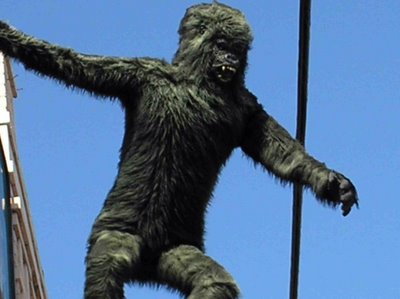
I.
There is a flash back to Kong’s early childhood, which explains everything. The flashback is in black and white. In fact, it is Mighty Joe Young , a film made after the original King Kong, but before the remakes. The flashback explains everything. Kong was discovered earlier as a child talent and brought to New York. He fell in love with a blonde ingenue. He was betrayed. He died. This all happened before. What happens now, in the new movie is all a recapitulation for Kong, a compulsion to repeat, an eternal return, a temptation to try and relive and master certain pivotal experiences. In this light, Kong’s fall resembles that of Jimmy Stewart in Vertigo and engages similar themes.
II.
There is a further flash back to Kong’s earlier childhood. He’s just a little massive baby, a cute little boulder with little black dots for eyes. His parents stand above him, massive trunks of black fur. We can hear them talking but cannot make out what they are saying. The father is louder. The mother seems to reply in calming tones. “King of the Jungle!” “King of the Jungle!” the father seems to be repeating, though it is not clear if it is a question, a sneer, a boast, a blessing or an affirmation. His legs seem to sway a little. Is he drunk? We don’t learn that much about Kong’s parents.
III.
Kong’s best friend growing up is a dinosaur named Harold. We see them playing together, the cute little gigantic monkey and his enormous reptile pal. They play tricks on one another. They get into trouble. They have adventures. Harold likes being groomed like a little bird. He affectionately pecks at things in Kong’s fur. They share a piece of jungle pie. “Do you suppose there’s something out beyond Skull Island?” asks Kong. Harold doesn’t know. He’s too busy working on his muscle car.
IV.
This background gives a great deal of depth to the scene in the movie where Kong and the dinosaur fight to the death: the action is sudden, violent, and senseless. Why does Harold attack? Anger at some falling out that we have missed? Did they become rivals or enemies at one point? Or lovers? Is it jealousy? Does Harold know what will become of Kong and Skull Island now that the White Man and Sexy White Woman have arrived? Is Harold’s action a political action, an act of resistance? A final gesture of friendship, of love for a world they once shared? The picture does not answer these questions.
V.
In the context of the new film, it is clear the woman, Ann Darrows, has a “jungle fever” thing. The point is made subtly: the World Wildlife Federation tote bag, her musical tastes, her speaking Spanish, her DVD collection including Gorillas in the Mist and all the Planet of the Apes movies, her string of exotic boyfriends who she clearly fancied, but couldn’t connect with. She is also the direct relation of Clarence Darrows, of the Scopes “Monkey Trial.”
VI.
Kong asks a lot more questions in the new version. Not just “What is that?” and “Where are we going?” and “What time is it?” but also: “Is this New York?” “Is he kidding?” “How do you tell if a girl likes you?” “Do I have to wear I tie?” and “Is that the tallest building?”
VII.
In an intense confrontation scene, Kong meets bad, bad Leroy Brown.
VIII.
Kong cries. As he climbs the Empire State, Kong realizes that she doesn’t love him, at least not the way he wants to be loved and that his desire, his need for this love has taken a destructive turn for them both. His tears make the sound of bombs falling on the way down; people and cars bounce around like ants in rain. They talk about it. “I loved you more ” says she. She is always saying that. Kong finally thinks about it. In what sense is this true? Considering all that’s happened. Kong wonders what she means and why it’s important to her, but before he can finish the thought, there is the sound of biplanes.
IX.
Kong sings. Not a lot, but over the end credits.
I fell into a burning ring of fire
I went down, down, down
and the flames jumped higher
and it burns, burns, burns
the ring of fire
the ring of fire


